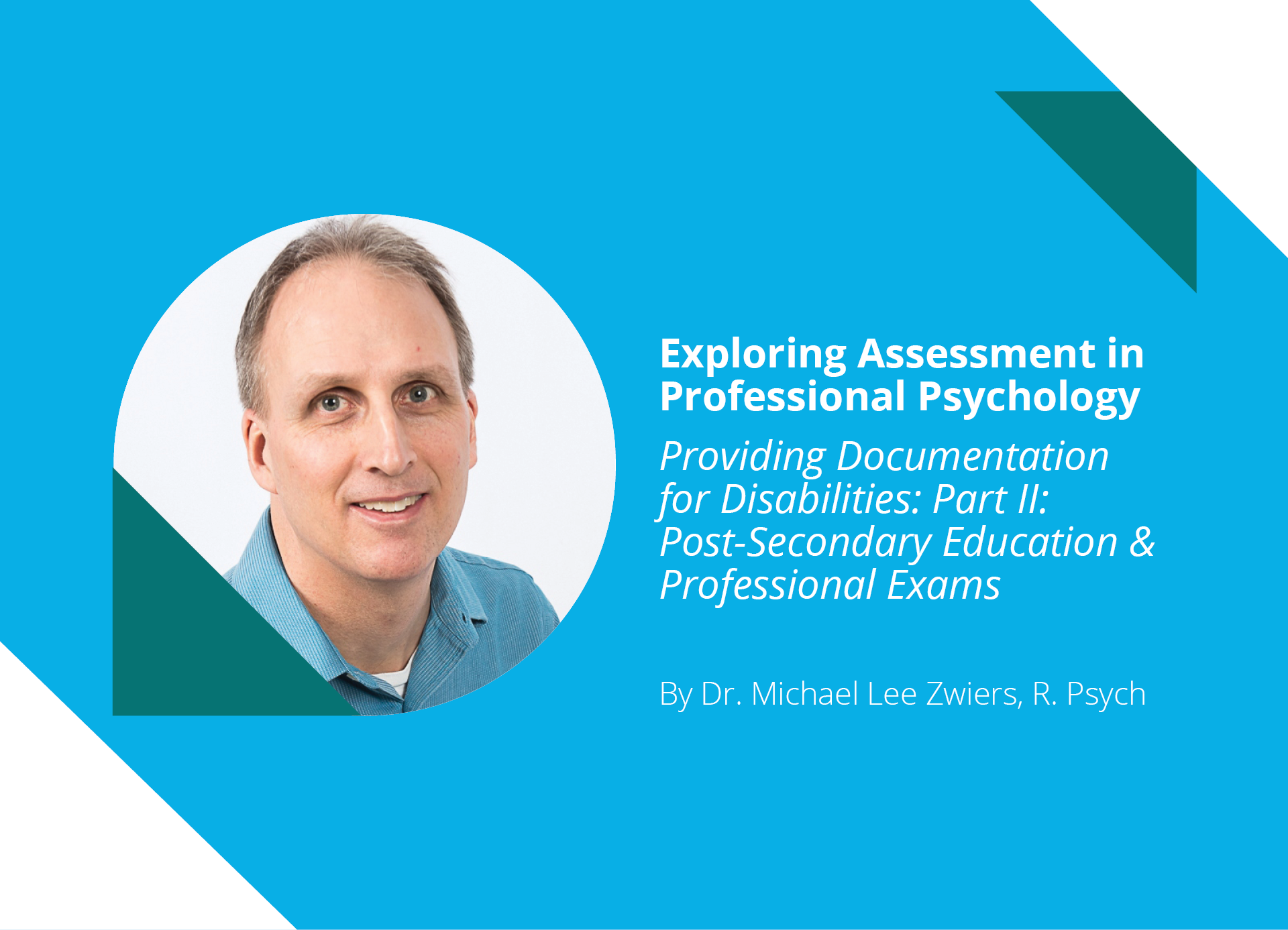
4 minute read
Exploring Assessment in Professional Psychology
Providing Documentation for Disabilities: Part II: Post-Secondary Education & Professional Exams
By Dr. Michael Lee Zwiers, R. Psych
Before I address this new content, I want to take a brief look back at the original article written in the June 2024 Psymposium. I wrote Part I of this two-part series on the psychologists’ role in providing documentation to support clients’ applications for disability supports, services, accommodations, and benefits. The timing appears to have been serendipitous, as I have seen a burgeoning of clients seeking my support to complete the Canada Revenue Agency (CRA) Disability Tax Credit form for them. I turn some people away at the outset, clarifying that this is not a frivolous application to make in the hopes that one might be approved. The current eligibility standard is quite high, and a medical practitioner must certify that the individual has “a severe and prolonged impairment in 1 of the categories, significant limitations in 2 or more categories, or receive therapy to support a vital function.”
Psychologists are authorized to provide information regarding impairments within the category of Mental Functions for everyday life. According to the CRA, this includes: adaptive functioning, attention, concentration, goalsetting, judgment, memory, perception of reality, problem-solving, regulating behaviour and emotions, verbal and non-verbal comprehension. That should be straightforward enough, right? But we must be aware that the CRA definition of each of these categories will likely not match your own. For example, the category of “Attention” is limited to only: a) the ability to demonstrate awareness of danger and risk to personal safety, or b) the ability to demonstrate basic impulse control. And the category of “Memory” refers only to the ability to remember: a) basic personal information (e.g. date of birth and address), b) simple instructions, or c) material of importance and interest to themselves. The CRA has also clarified that mental functions for everyday life do not include the ability to work, to do housekeeping activities, or to engage in recreational activities.
In addition, the CRA clarifies that an applicant is considered markedly restricted in performing mental functions necessary for everyday life only if they are: a) unable to do the activity, or b) it takes 3 times longer than someone of similar age without the impairment, even with the use of appropriate therapy, medication, and devices. Finally, the restriction must be present all or almost all the time (generally at least 90%) and has lasted – or is expected to last – for a continuous period of at least 12 months. When completing an application, we must attest to each of these components.
“When you complete these forms, proceed thoughtfully. You are not only taking legal responsibility for your statements and potentially putting your reputation on the line, but you are also representing the broader profession of psychology .”
Not only must you pay attention to carefully assessing these core areas of functioning, but you must also ensure that you have documentation for all the years that you certify. Recently, the CRA audited an application that I completed for a client, requesting that I provide all the documentation that I used to support my responses and ratings. They were particularly interested in historical documentation that covered the years before I met the client (e.g. prior psychiatric and psychological assessment reports). So, take heed and be sure you carefully document your decisions and retain the data that supported your ratings.
I also wanted to advise you of companies across Canada that support clients by preparing clinician letters to provide to you as the medical practitioner. These companies can be quite persuasive in trying to convince you to use their wording and adopt their ratings of the client. For example, a disability application coach indicated that my wording needed to be stronger or the client would not qualify. Of course, my goal is not to ensure that a client qualifies for the tax credit, but to ensure that the CRA has trustworthy information to help them decide based on their own criteria. When I provide context or examples, I try to distinguish client information that was objective or observed by myself from self-reports that I collected via an interview (i.e., “She described her home as messy and disorganized…”).
When you complete these forms, proceed thoughtfully. You are not only taking legal responsibility for your statements and potentially putting your reputation on the line, but you are also representing the broader profession of psychology which the government has entrusted with accurately completing these forms.
Now to Part II: Providing Documentation for Disabilities in Post-Secondary Education and Professional Exams...





